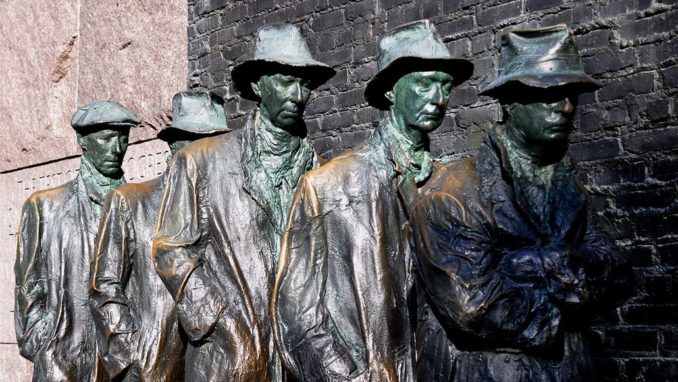
“Great Depression Food Line” by Kevin Burkett is licensed under CC BY-SA 2.0
Things don’t just “happen”. Everything in the passing parade of phenomena is the result of something that preceded it: this is the world of cause and effect. Those appointed to hold the levers of power therefore carry a huge responsibility to act with foresight born of knowledge. They need to understand that consequences will flow from their actions, consequences that will usually be predictable. In short, they need to know what they are doing.
This truism applies in every field of human endeavour – but it takes on special importance in the realm of economics, because that, to a greater or lesser degree, affects us all.
When simply looking at economic consequences it’s not difficult to tell whether the actions that produced them stemmed from a condition of knowledge, or a condition of blind ignorance – or somewhere in between.
What does the most cursory survey tell us?
1 – It hardly matters where we start, but consider the linked rise in government welfare spending; higher borrowings; and the budget deficit – all of which are, of course, consequences of earlier actions, but no matter. To fund this deficit and pay interest on the debt, tax increases are imposed – including VAT, which directly punishes the poorest citizens and therefore pushes up welfare costs; and taxes on employment that serve only to increase unemployment and generate the need for still more welfare benefits. Do you detect anything in this self-defeating, circular regression indicative of a guiding wisdom?
Save or spend
2 – We all acknowledge, instinctively, the importance in our lives of thrift – usually evidenced in the build-up of savings, the opposite of squander or waste. This sounds like a very good thing – but so-termed macroeconomic thinking has for decades been soaked in the mindless elixir of spending, rather than thrift, as the deity at whose shrine we must worship if economic salvation is to be assured. Governments of all stripes indulged in a policy of managing “aggregate demand” – Keynes’ counter-intuitive theory of economic stimulus, despite its utterly predictable, and oft-repeated, failures. But governments loved it because it provided a theoretical justification for the malpractices they were perpetrating anyway: stimulating demand by printing unbacked money and contriving interest rates.
Keynes detested savings, despite the obvious fact that savings (as the debt-free alternative to borrowings or taxes) represent the true engine of creative enterprise, and are therefore rarely idle. But in today’s topsy-turvy madhouse, savings, being deferred consumption, are actively penalised. Governments, having insidiously extinguished interest rates to cheapen their own massive borrowings, now contrive an even weirder set of theories to justify the practice of charging penalties for holding, rather than spending, money!
Natural law of interest works without a central bank
3 – Once again, we see that the lunatics have seized the keys to the asylum. Reason tells us that interest rates arise from the respective time-preferences of parties to any transaction whose completion is delayed. If you need money now, I could lend you, say, £8,000 subject to a repayment of £10,000 in 10 years’ time. Interest of £2,000 is therefore “implied in the logic of human action.” The “time preference” of the borrower manifests itself in the interest rate. The greater the time preference (the more urgently the borrower needs the money) the higher the rate applicable.
Therefore, since the natural law of human interaction, guided by availability of funds in the market, determines the interest charge, who needs a central bank? Credit markets perform the crucial function of channelling resources from savers to investors, establishing equilibrium between them and enabling both to contribute to wealth creation in the community.
The opposite of savings is waste
Waste is derived from “devasto”, a Latin word used throughout the ages to connote devastation, ravage, or slaughter of resources – actions hardly conducive to economic progress.
4 – Only today we read that the government spending watchdog, the National Audit Office, has identified awards to a recently formed company of contracts worth £135million for procurement of Chinese ventilators, at an average cost per ventilator of £50,000. Yet these are machines that normally sell for about £8,000. Taxpayers have been fleeced for equipment that, in the end, was never needed anyway. Given the ubiquity of players in high places, this is just one of a series of contracts that raises the spectre of cronyism in the procurement process, details of which are never published. Waste? You couldn’t make it up!
Even without stirring the hornet’s nest of protective equipment procurement, consider this, as unearthed by Freedom of Information requests: the annual wage bill of government departmental staff now paid to focus on “equality”, “diversity”, “inclusivity” or “unconscious bias training” stands at £11.3 million, at average rates of pay. As one MP put it, “we’re wasting this money on an ineffective agenda to push left-wing ideology through our public institutions.” The CEO of the independent Tax-Payers’ Alliance is not impressed: “With the highest tax burden in 50 years and imminent public sector pay-rises, taxpayers are crying out for someone to get a grip.”
Value-for-money? Whose value? Whose money? PJ O’Rourke put it succinctly: “Giving money and power to government is like giving whisky and car keys to teenage boys.”
5 – Liverpool is in a high-risk area, yet Covid patients occupy only one-fifth of its hospital beds. It now has 10 ventilator beds available for every Covid patient! Hospitals in London, also in Tier 2, coped well enough when Covid cases were coming in at 10 times the current rate. So why the draconian restrictions? Certainly not to “protect the NHS” – a slogan that has rankled so many doctors who strongly believe that the NHS exists to protect the public, not vice versa. Yet somehow that piece of unashamed political messaging worked – and admission rates for a host of cardiac and cancer conditions have plummeted. In this looking-glass world the NHS succeeds chiefly by telling people to stay away from it!
Seventeen out of eighteen state-of-the-art Nightingale hospitals in London are now being dismantled. Waste? Minor miscalculation? Or should the culpable halfwits be consigned to a facility for psychiatric correction – assuming there’s still room for them?
How to insult the jobless – tell them to retrain
6 – The idea that government has the ability to extricate us unscathed from the chaos it has created is what links these instances of scarcely credible incompetence.
Rising numbers of young people are searching desperately for jobs that have been vaporised by the crippling effect of lockdown. Telling them to retrain, or apply for an apprenticeship in an unfamiliar discipline is both useless and offensive. In a recent interview the Chancellor suggested that unemployed workers should look for a “new and fresh opportunity”. This official statement of the obvious betrays an ignorance of what would help. The transformation of an apricot farm into Silicon Valley was shaped by talented people meeting for a drink and a chat after work. We can only guess at the scale on which innovation in this country has been hobbled by state-sponsored crippling of its hospitality sector.
Having effectively shut down the economy, and facing nigh on a million out-of-work private sector workers, government officials are pointing at the new online “careers service” on the government website. Applicants are encouraged to take a test, devised by an algorithm, that will tell you whether to retrain as a pizza-cook or a lion-tamer. These out-of-touch buffoons actually believe that feeding complex information about human needs into a computer will come up with something useful. One wonders what would happen if politicians fed in their own data. Perhaps they would be advised to retrain as “Heads of IT”!
What is “essential”?
7 – Ignorance of economics is most blatantly betrayed when Ministers of State, or their public sector subordinates, take it upon themselves to identify “key workers” operating in an “essential business”. Supermarkets are desperately important, of course, but keeping their shelves full requires lorries, farms, port workers, warehouses, manufacturers or recyclers of food tins, cardboard boxes and plastics. What about IT services, store cleaners, petrol stations and motorway services for the lorries, and all the jobs that enable these industries themselves to operate?
Do the functionaries paid to dream up this algorithmic bullshit ever consider whether their own “contribution” is essential? As observed by the great GBS, a government that robs Peter to pay Paul can always count on the support of Paul.
It is one of the most fundamental laws of the science of real economics, division of labour, that lies behind the interconnectedness of this network of inputs. It also highlights the sheer stupidity of trying to second-guess which bits can safely be removed on a political whim without bringing down the entire structure.
I speak, of course, of the “private” sector of the economy in which a business is viable because its owners have succeeded in controlling costs, avoiding waste and pricing its products by reference to the market. If that business is able to contribute to the economy by remaining viable, then, by heavens, its products and all who work in it, are essential!
So what would you do?
I am having to contend with my wife, who complains that my essays are too pessimistic, negative and downbeat. She says “that’s all very well, but what would you do, wise guy?”
Good question.
I would of course explain to my readership, yet again, that in anticipation of a currency collapse our lords and masters should be preparing to launch a new commodity-backed currency. It succeeded in Germany 100 years ago, and I would advise them to issue a declaration of unilateral free trade rather than fiddle about with obfuscating trade agreements. And so on.
But in the context the seemingly interminable parade of cock-ups just listed, perhaps the safest advice right now would be to heed the words of the White Rabbit in Disney’s “Alice in Wonderland”:“Don’t just do something – stand there!”
© Emile Woolf November 2020 (website)
The Goodnight Vienna Audio file
Audio Player



